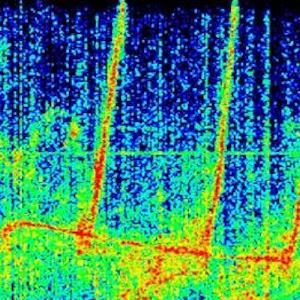As a tribute to the artist and her vast archives of electronic, classical and abstract music, we present a short essay and 700MB free download consisting of ambient, vocal and classical works [Solo and with the seminal White Noise Collective]
Born in 1937 in Coventry inside a conservative post-war, yet well-to-do all english atmosphere. Knocking away on a piano as early as 8 years old, she recalled later that "The radio was my education". Her school background and talent in mathematics earned her offers from Oxford as well as Cambridge colleges and her disdain for institutional structures of education is clear in some of her compositions and vocal narratives recorded in late 1960's. Derbyshire was relatively unhappy with her progress in mathematics and she decided to try a career in music. Sounds allured her more than numbers. She first applied to Decca Records, where she was turned down as they “did not employ women at their recording studios”. She then worked for the United Nations at Geneva, teaching mathematics and piano to the children of international diplomats. Having slowly amassed many instruments, including basic synthesizers, effects and noise generators, circa 1960, she plunged into the world of radio and sound design at the B.B.C
Her lyrical thought-streams are difficult to decipher but it's obvious she strove for freedom of expression, lead by taking big chances inside a male dominated, conservative, post-war England as well as continue to surprise many composers of today. Listening back to Derbyshire today would be associated with multiple cultural manifestations. Furthermore, Derbyshire seems to have been capable of working to visual analogies where demanded by the production: the pre-eminent example of her ‘visual’ approach to sound is the “beautiful Gothic altarpiece” requested by Barry Bermange for his production for radio, titled Amor Dei. Her compositional, lyrical and technical prowess was often blazing and dark to say the least, yet subverted or overshadowed by less competent men in positions of authority. Take the example of institutional injustice, as it took almost 30 years for the B.B.C to rescind the original credits of Dr. Who in favor of Delia Derbyshire (and not just Ron Grainer) , as rightful co-authors. Obviously she was aware of the patriarchy and hegemony and continued regardless in her quest for unknown sounds, warping classical forms and cull-out new ways of composition. As a sound engineer, she was definitely one-of-the-first to venture into new 'audio dimensions' with echoes, delays and cut and resample tape [way before Dub and Reggae producers and engineers like Lee Perry & King Tubby] as early as 1964. Her experimentation went batty eventually.
What certain plug-ins, samplers and automation processes today are one click... Also it can be little hysterical at times given the mass complexity of her chords, use of instruments, the bizarre drones and highly dynamic and moody energy. "If you cannot imagine sound, how can you compose?" She asked in an essay printed in 1974 by the studio Electrophone. Her creative process and various tape related techniques has been recently studied here for new composers and sound designers. www.delia-derbyshire.org/ Delia's compositions, short and long along-with her sound archives have been used in over 400 different programs at the BBC and innumerable, uncredited times in various television and cinematic instances in Europe, America and Japan.
Born in 1937 in Coventry inside a conservative post-war, yet well-to-do all english atmosphere. Knocking away on a piano as early as 8 years old, she recalled later that "The radio was my education". Her school background and talent in mathematics earned her offers from Oxford as well as Cambridge colleges and her disdain for institutional structures of education is clear in some of her compositions and vocal narratives recorded in late 1960's. Derbyshire was relatively unhappy with her progress in mathematics and she decided to try a career in music. Sounds allured her more than numbers. She first applied to Decca Records, where she was turned down as they “did not employ women at their recording studios”. She then worked for the United Nations at Geneva, teaching mathematics and piano to the children of international diplomats. Having slowly amassed many instruments, including basic synthesizers, effects and noise generators, circa 1960, she plunged into the world of radio and sound design at the B.B.C
Her lyrical thought-streams are difficult to decipher but it's obvious she strove for freedom of expression, lead by taking big chances inside a male dominated, conservative, post-war England as well as continue to surprise many composers of today. Listening back to Derbyshire today would be associated with multiple cultural manifestations. Furthermore, Derbyshire seems to have been capable of working to visual analogies where demanded by the production: the pre-eminent example of her ‘visual’ approach to sound is the “beautiful Gothic altarpiece” requested by Barry Bermange for his production for radio, titled Amor Dei. Her compositional, lyrical and technical prowess was often blazing and dark to say the least, yet subverted or overshadowed by less competent men in positions of authority. Take the example of institutional injustice, as it took almost 30 years for the B.B.C to rescind the original credits of Dr. Who in favor of Delia Derbyshire (and not just Ron Grainer) , as rightful co-authors. Obviously she was aware of the patriarchy and hegemony and continued regardless in her quest for unknown sounds, warping classical forms and cull-out new ways of composition. As a sound engineer, she was definitely one-of-the-first to venture into new 'audio dimensions' with echoes, delays and cut and resample tape [way before Dub and Reggae producers and engineers like Lee Perry & King Tubby] as early as 1964. Her experimentation went batty eventually.
What certain plug-ins, samplers and automation processes today are one click... Also it can be little hysterical at times given the mass complexity of her chords, use of instruments, the bizarre drones and highly dynamic and moody energy. "If you cannot imagine sound, how can you compose?" She asked in an essay printed in 1974 by the studio Electrophone. Her creative process and various tape related techniques has been recently studied here for new composers and sound designers. www.delia-derbyshire.org/ Delia's compositions, short and long along-with her sound archives have been used in over 400 different programs at the BBC and innumerable, uncredited times in various television and cinematic instances in Europe, America and Japan.
Her ex-boyfriend David Blackburn paints a grim picture about her life in the late 70s through the 80s as "in private, she never stopped writing music. She simply refused to compromise her integrity in any way. And ultimately, she couldn't cope. She just burnt herself out. An obsessive need for perfection destroyed her". Derbyshire died of renal failure, aged 64, in 2001. The world didn't shed tears like it did for Hendrix, Lennon or Prince or even Joplin. She died quietly, long before listeners recognized her true legacy and like many pioneers, she too was a feisty, committed musician who paved the way for hundreds of serious composers (women and men). Yet she isn't around to 'see' (or hear) the fruits of her labors and vision. Regardless, she inspired many women to take up music and production as an equal, be it a 'job' or art. Surely the "Delian Mode" has percolated far and wide in the history and progress of electronic music. A documentary about her life, works and the derivative pop culture surrounding her music: thedelianmode.com/































0 -